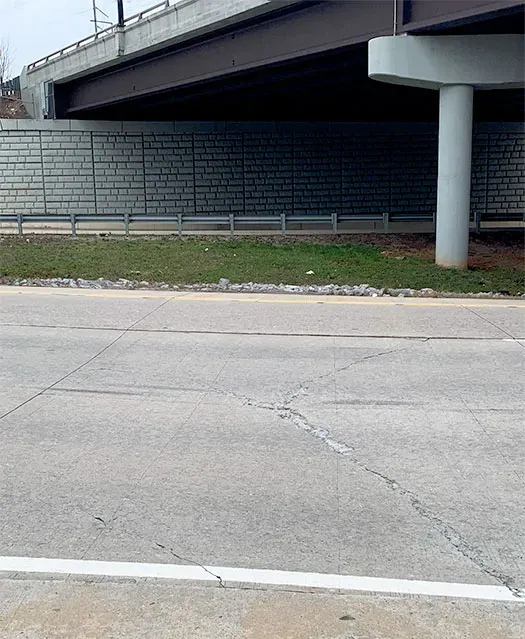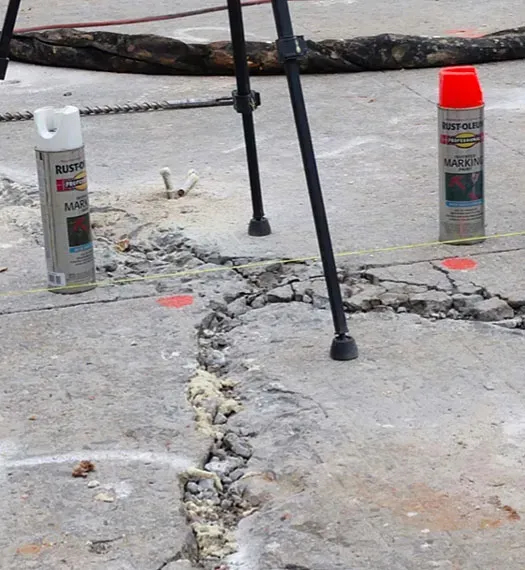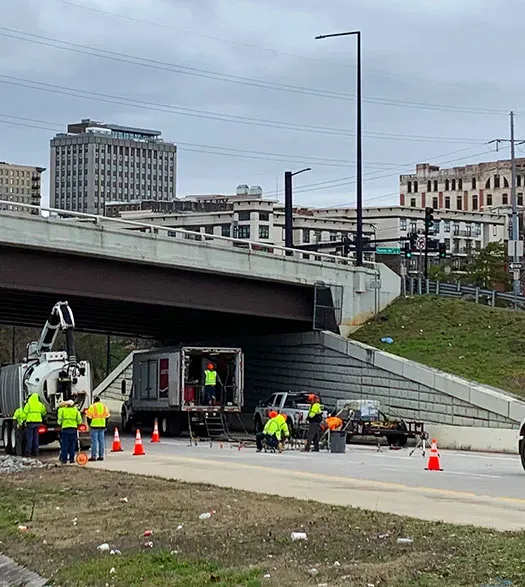James White Parkway Settlement Resolved in Knoxville, Tennessee
Problem
Tennessee DOT officials were faced with a serious situation involving two concrete road panels on the James White Parkway in Knoxville. Two lanes were affected, and obvious settlement had created a sudden dip in the road that presented a clear safety hazard for drivers. Over the course of 30 linear feet, the pavement system abruptly dropped and rose more than four inches, creating an extremely unsafe situation for traffic moving at highway speeds on the parkway. TDOT officials called URETEK.
Analysis
The cause of the settlement was unknown, as no utilities were believed to be in the area. A sinkhole was suspected, but its presence was unconfirmed. URETEK’s crew arrived on the scene and conducted Dynamic Cone Penetrometer (DCP) testing which indicated weak soils present to a depth of approximately 16 feet below the surface. Upon closer inspection, an unmarked storm drainpipe crossing the area was discovered. This unknown drainage pipe likely played a role with the current settlement issues.
Solution
Upon completion of DCP testing, URETEK proposed a plan built around URETEK Deep Injection® (UDI). A site-specific injection pattern was created to strengthen and stabilize the supporting soils beneath the roadway and lift the settled slabs. With the discovery of the storm pipe, URETEK again consulted the DCP test results and modified the injection plan to stabilize deeper than originally estimated and to work around the storm pipe. The new plan would stabilize the area and help bridge loads across the pipe. As a precaution, the City of Knoxville sent a crew out to investigate the storm pipe with a camera and monitor the pipe during injections to confirm that the pipe interior remained unobstructed during the injection process.
Result
In just 2 ½ days in the field, URETEK stabilized the soft soils and lifted the dipped section of road to within 1/4 inch of the original grade. The drivability for drivers was significantly improved. Interestingly, a small amount of polyurethane grout was discovered to have infiltrated the storm pipe during UDI. While the grout inside the pipe was not significant enough to impede the flow of water, its presence did confirm that pipe integrity was a likely cause or contributor to the settlement under James White Parkway. Finding grout within the pipe following UDI indicated that there had been a break in the pipe, and that over time water had leaked out through the break. Subsequently, fine soil particles had flowed back into the pipe, and over many seasons this process had slowly compromised the subbase soils underneath the roadway. The UDI application immediately decreased the Inflow & Infiltration (I&I) issues present at the identified pipe break and successfully mitigated future settlement issues with the road above.
URETEK Deep Injection® (UDI)
Widely referenced throughout our industry, UDI involves the injection of structural polymer into base and sub-grade soils to increase the load bearing capacity. This is achieved by injecting the polymer through small holes drilled directly through the pavement structure to depths determined by site-specific analysis. Our URETEK 486 Star® material flows easily into voids and weak zones within the soil mass below. Through a controlled chemical reaction, the expanding polymer compacts surrounding soils and applies a controlled pressure on targeted areas of the affected pavement above. If needed, a multi-injection design plan is utilized to gently return the pavement to its original grade. The composite material quickly cures into a strong, dimensionally stable, and water-resistant geo-material, providing years of reliable service.
URETEK 486 Star®
URETEK 486 Star® polymer is a two-component, high-density, expanding thermoset polyurethane system. It was developed to be the ideal solution for under-sealing, void filling, lifting of settled pavement, stabilization and stiffening of weak soils, and for encapsulating and sealing buried infrastructure. URETEK 486 Star® is environmentally inert, non-toxic, and resists underground water erosion or weakening due to its industry-leading hydrophobic properties.


